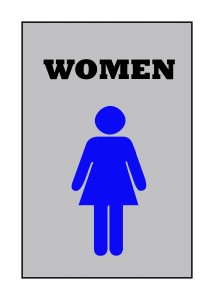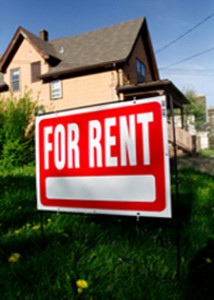Posted by Teresa on April 9, 2013 under Landlord and Tenant FAQs | 
 One question that many new landlords ask is whether or not they are liable when a tenant suffers injuries or damages while living in the rental property. Others wonder if they need landlord insurance, or if their homeowner’s policy will cover them.
One question that many new landlords ask is whether or not they are liable when a tenant suffers injuries or damages while living in the rental property. Others wonder if they need landlord insurance, or if their homeowner’s policy will cover them.
We’re not insurance experts, so if you have questions specific to your situation, consult your insurance agent. But we can offer some common-sense guidelines.
First of all, when you become a landlord and lease out your property, you take on more risks. In many states and cities, landlords are also held to certain rules regarding safety. So if a tenant falls down the stairs, for example, you could be liable for her injuries, depending on whether or not proper handrails, non-skid surfaces and other safety measures are in place.
If you have followed all the rules, the tenant’s personal insurance might cover her losses. But if not, she might try to seek retribution from you.
What about when a water pipe bursts and water leaks in your rental unit, soaking the carpet, damaging the ceiling below or soaking into the drywall? Water can do a lot of damage, as can fire. You need to protect your business and personal assets from the costs of rebuilding from fire, water and smoke damage.
These are three good reasons to have landlord insurance. A liability policy will protect you from damages. However, it’s important to realize—and tell your tenants—that your liability policy will not typically cover their possessions. They’ll need their own renter’s insurance for that coverage. Renter’s insurance will also cover tenants if they are negligent and cause injury or damages.
It’s a good idea to require tenants to have renter’s insurance.
Start your tenant relationship off right by knowing who you’re leasing to. Protect your rental property and assets with tenant background checks. Proper tenant screening will ensure you are leasing to the best possible tenants.
Posted by Teresa on February 15, 2013 under Eviction, Lease and Rental Agreements | 
 Even in a good rental market, it’s important to hold onto good tenants. What defines a “good tenant?” Well, nobody’s perfect, but if your tenant pays the rent on time, follows your rules and doesn’t cause any problems, that’s pretty close!
Even in a good rental market, it’s important to hold onto good tenants. What defines a “good tenant?” Well, nobody’s perfect, but if your tenant pays the rent on time, follows your rules and doesn’t cause any problems, that’s pretty close!
But good tenants sometimes fall short, and it can be tempting to draw the line and get rid of them in favor of an even better tenant. Or you might just cross your fingers and hope they move at the end of the lease.
Unless a tenant is breaking the terms of the lease by paying rent late, keeping pets that aren’t allowed, smoking or making too much noise (or any of the long list of grievances landlords have against their tenants), it might be worth your while to let them stay or to entice them to renew their lease.
Keeping good tenants is just good business. Turnover costs money. When a unit is empty, it creates no income. In the meantime, you still have associated overhead costs. Taxes, mortgage expense, lawn service and interest will go on after the tenant leaves. It might not take long to get a new tenant, but then again, it could be a month, two months or longer.
Getting new tenants costs money, too. You’ll need to clean the unit, have the carpets professionally cleaned, touch up the paint (or do a complete repaint) and do all the necessary repairs. Plus, you’ll need to advertise the rental, conduct tenant screening on applicants, and take the time to show the unit.
Empty units look bad to existing and potential tenants. Your other tenants may wonder why others are leaving. Prospects may see “for rent” signs in front of your property too frequently and wonder what’s wrong.
On the other hand, stable tenants mean a stable property. Stability is very valuable in the long run, both financially and in terms of landlord sanity!
While no landlord or property manager should ever allow tenants to pay the rent late, break the terms of the lease or walk all over you, good tenants are worth keeping.
Start your tenant relationship off right by knowing who you’re leasing to. Protect your rental property and assets with tenant background checks. Proper tenant screening will ensure you are leasing to the best possible tenants.
Posted by Teresa on January 31, 2013 under Rental Market | 
 After the housing crash, more renters were created. As the housing and job markets recover, will most of these new renters become homeowners? Maybe not. Many factors that moved people into homeownership have changed since the economy collapsed, and the trends show that the rental market will continue to be strong—and fueled by women—for the foreseeable future.
After the housing crash, more renters were created. As the housing and job markets recover, will most of these new renters become homeowners? Maybe not. Many factors that moved people into homeownership have changed since the economy collapsed, and the trends show that the rental market will continue to be strong—and fueled by women—for the foreseeable future.
Why women? Specifically, single women, according to economists. It all comes down to education, marriage and children. Back in 2000, the number of men and women in college was pretty even; today, there are three million more women in college classrooms, and four million more female college graduates in the workforce. Women over 25 are having a harder time finding educated men to settle down with.
Therefore, women are putting off marriage, children and home ownership. They don’t need three bedrooms, two baths and a yard when they’re single and childless. And even women with children are more likely to be single these days—and they also prefer renting in-city apartments to buying or renting single-family homes.
More than ever, women are driving the rental market. They like renting a nice apartment in a neighborhood they wouldn’t necessarily be able afford to buy a home in. Rentals come with lawn care and maintenance, and in many apartment buildings, gym facilities and other amenities women want.
Studies show that renter household formation is the strongest it’s been in decades. Most landlords and property managers simply aren’t seeing a big push of tenants becoming homeowners. And with 23 million young adults under 35 living at home with their parents, it’s likely that s job growth improves, millions of new renters will enter the market, increasing demand, lowering vacancies and causing rents to rise.
Remember, women want safety and security in their housing. That’s why it’s more important than ever to consistently conduct tenant screening on every applicant before signing a lease. You need to know whether the name on the application is really the person you’re leasing to, as well as if there is any criminal activity in his or her background. Screen for acceptable credit scores, too, so you know you’re leasing to the best possible tenant.
Posted by Teresa on October 19, 2012 under Marketing for Landlords | 
 Years ago, apartment residents were accustomed to receiving printed newsletters in their mailboxes or on their doorsteps. Since print is going the way of the rotary phone, many property managers now use e-newsletters to communicate with tenants. But some who started a newsletter with all good intentions have let it slide, and now find it’s been months—or years—since the last issue.
Years ago, apartment residents were accustomed to receiving printed newsletters in their mailboxes or on their doorsteps. Since print is going the way of the rotary phone, many property managers now use e-newsletters to communicate with tenants. But some who started a newsletter with all good intentions have let it slide, and now find it’s been months—or years—since the last issue.
Newsletters don’t have to be difficult or terribly time-consuming. And not using them to communicate with residents is a missed opportunity. You might think residents don’t care about what’s happening around your community, the truth is that most would greatly appreciate it.
Here are some easy tips for interesting newsletters you’ll enjoy putting together and your tenants will enjoy reading:
- Add a “news” section. In it you can announce new staff, upgrades, additions to your fitness center, DVD or book library.
- Seasonal items are easy to include. Since Halloween is coming, then Thanksgiving and the winter holidays, you’ll have plenty of opportunities to write about parties, decorating ideas and safety tips. Add a calendar of events from your town or city.
- Include contests. Promote your Facebook page by encouraging residents to “like” your page. Offer a prize drawing each month for movie or play tickets, or gift certificates to local businesses.
- Promote early rent payment. Conduct a monthly drawing that includes only residents who pay their rent early. Offer a $100 prize and see how quickly you see rent payments come in early!
- Reminder tenants about policies. Include a short piece each month that features one policy. You might want to explain the reason for the policy and review guidelines.
- Partner with local schools and community groups to include their events in your newsletter. Include volunteer opportunities, too.
- Add interesting facts and figures. For example, list the number of dogs and cats in the community, local crime stats or the number of trees on the property.
- Have a monthly poll. Ask questions like, “What is your favorite thing about living here?” or “What is one thing we can do better?” Ask fun questions such as favorite pie, best cupcake in town or “most interesting thing you saw on your way to work today.”
Remember, the purpose of a newsletter is to improve communication with residents. Include the basics, like contact information for all staff, emergency after-hours numbers, email addresses, and website and Facebook urls. Use your newsletters as an opportunity to tell residents what’s new, help them get to know your staff better and learn more about living there. Make it fun and interesting, and tenants will read it!
Posted by Teresa on October 10, 2012 under Landlord Tips | 
 If you’re thinking of joining the millions of real estate investors who either make a living or add to their income by leasing property, we’ve got some basic tips for you, suggested by our clients, or based on our own experiences.
If you’re thinking of joining the millions of real estate investors who either make a living or add to their income by leasing property, we’ve got some basic tips for you, suggested by our clients, or based on our own experiences.
Think about your goals: Do you want to secure your retirement by creating wealth or income-producing investments? Are you in it for the short term, or the long haul? Do you want to buy property locally, or wherever the deals and returns are the most favorable? How much time and effort are you willing to put into this venture? Do you want to be a hands-on or hands-off landlord?
- Have a long-term view. Buying and flipping houses for profit is generally a thing of the past. Today’s real estate investors have a long-term plan for growing their portfolios slowly over time. They save money to build up a cash reserve, in case of emergencies. And they plan for making bigger improvements, such as painting, roof replacement and structural repairs.
- Keep it local. Sure, there are bargains to be had in Arizona, Nevada and Florida, just to name a few areas. But unless you already live in these states, it will be difficult to manage your rental property. Hiring a property manager is viable option, but it will cut into your profit. Besides, there is nothing like being able to drive past your property to check on it.
- Do the research. Find out the history of the property you’re interested in. Become familiar with the zoning laws in the town and neighborhood. Find out if there are any plans for development, road construction, or commercial building in the area around it. You don’t want to buy a property on a quiet street, only to find out that it’s been zoned for a strip mall.
- Find out what the local rental market needs. If you invest in three-bedroom, single family homes, but the demand is for one-bedroom condos, you’ll have a problem.
- Keep emotions out of the equation. Don’t fall in love with a rental property. Keep it strictly business. Figure out your costs, including mortgage payments, taxes, interest, upkeep, licensing, etc. Determine the market rent for the unit/s. And then determine if the asking price is a good deal. Don’t pay more than your monthly costs, or you’ll be losing money. That’s not the idea behind investing in real estate!
- Screen every tenant applicant. We can’t stress enough the importance of tenant screening. Too many landlords have regretted the decision to skip this important part of the process. Conducting a background and credit check on a prospective tenant is the best way to protect yourself. Make sure you know as much as possible about the person you are renting to.
Disclaimer:
The contents of this article are intended for general information purposes only, and should not be relied upon as a substitute for obtaining financial advice applicable to your situation.
Posted by Teresa on March 31, 2011 under Landlord Tips | 
 So, you’ve landed a new tenant for that vacant rental you’ve been showing. He paid the deposit, and you’re in the tenant background check phase of your due diligence process. Now you can take down the flier you posted at the local coffee shop, stop showing the unit and cancel your ads, right?
So, you’ve landed a new tenant for that vacant rental you’ve been showing. He paid the deposit, and you’re in the tenant background check phase of your due diligence process. Now you can take down the flier you posted at the local coffee shop, stop showing the unit and cancel your ads, right?
Sure, if you’re betting that the deposit check won’t bounce, the tenant credit report will come back at an acceptable level and the tenant’s references will all check out. But smart landlords know that anything can happen between the lease application and the lease signing. Tenants change their minds every day. References don’t check out. And credit scores are more iffy than ever these days. Maybe showing the rental property to additional prospective tenants is the better way to go.
Every landlord should have a back-up plan, just in case the shiny new tenant doesn’t prove to be 100% reliable. Besides, unless and until you have a signed lease, you don’t really have a new tenant.
There are several advantages to continue marketing a pending rental property:
- You’ll have prospects for your additional rental properties.
- Murphy’s Law says that as soon as you stop marketing one rental property, another one will become vacant!
- You can refer your prospects to other landlords in your network.
- A waiting list can move a hesitant tenant from “just looking” to “where do I sign?”
- You might find a better-qualified tenant than the one you’re working with.
Some landlords would say that “never” is when they stop marketing their rental properties. As in any profession, being proactive is better than being reactive in the rental property business. No matter how good a prospective tenant looks, make sure you have a back-up plan. Keep marketing and showing your rental unit and gather names for a waiting list—just in case the deal falls through.
Posted by Teresa on March 26, 2011 under Landlord Tips | 
 Pest control in rental properties is a continual issue in some areas—and not such a big deal in others. Unfortunately, mice (and rats) live almost everywhere, while scorpions, cockroaches and certain other multi-legged intruders are more bothersome to landlords in warmer climates.
Pest control in rental properties is a continual issue in some areas—and not such a big deal in others. Unfortunately, mice (and rats) live almost everywhere, while scorpions, cockroaches and certain other multi-legged intruders are more bothersome to landlords in warmer climates.
In years past, landlords often kept bugs under control with regular spraying of chemical pesticides. A greater awareness of the toxicity associated with these pest control treatments is prompting many rental property owners to revisit their standard control methods in favor of healthier alternatives for their tenants.
Fortunately, landlords now have more options when it comes to controlling cockroaches, ants, mice, rats, fleas, centipedes and even bed bugs in their rental properties. Cedar and other essential oils, along with enzymes are safe to use around pets, kids and food, and are used by increasing numbers of professional pest control companies.
One example is the use of microscopic animals called nematodes to control termites. Nematodes are added to water and then poured into termite nests, where they kill either the queen or enough worker termites that the queen eventually starves. Check with your pest control company to see if they offer natural and non-toxic alternatives.
Don’t forget that you can take control of certain pest problems without chemicals on your own. Peppermint oil is said to deter rats from entering an area, but it requires regular application. Keeping garbage secure and sealed tightly is another effective rat deterrent—so instruct tenants on proper garbage procedures. It’s never a good idea to put rat poison out where any other animal or child could ingest it!
Boric acid, which is very low in toxicity to people and pets, is often used to control carpenter ants and cockroaches. However, it is not always advised for use around food, where cockroaches tend to be. The best cockroach prevention is cleanliness. Frequent vacuuming, eliminating standing water and leaks, and keeping grocery bags and boxes outside are all methods that can help keep cockroaches under control.
If you’re trying to improve your green living score, take a look at one of the most toxic areas of managing rental properties: pest control. A little extra effort can keep your tenants safer and help them live healthier lives.
Posted by Teresa on March 21, 2011 under Landlord Tips | 
 One of the biggest challenges for landlords is maintaining their rental properties. Failure to do so can lead to further damage, unhappy tenants and lower property values.
One of the biggest challenges for landlords is maintaining their rental properties. Failure to do so can lead to further damage, unhappy tenants and lower property values.
Some landlords prefer to do all their own maintenance; others are not capable or simply don’t have the time to perform maintenance. Still others make the attempt to do it themselves, only to realize they’re in over their heads.
If you’re thinking about hiring a contractor or handyman service to take care of routine maintenance and emergency repairs on your rental properties, here are a few tips.
- Do you need occasional help or a full-time maintenance person? Would you rather hire expert plumbers, electricians and carpenters each time you need specialty work? Knowing what you need is the first step. A long-term contract for routine maintenance plus regular repairs might be more economical than calling an expensive contractor for a smaller job. And don’t forget that availability is sometimes a problem with busy general contractors. A regular maintenance contract means priority when you have an emergency.
- Once you determine your rental property maintenance needs, ask for referrals.When working with an contractor, it’s sometimes difficult to know whether you’re getting a good deal and getting good work—or being ripped off. Your local builder and remodeler association is the perfect place to start your research. Also ask other rental property owners in your network. You might hear an earful about whom to avoid—and who is most trustworthy.
- Once you’ve narrowed your choices down, it’s a good idea to conduct a “job interview” with each one. Even though they will likely be a subcontractor, and not an employee, you’ll still need to be sure that there is a good rapport and mutual respect between you. If you’ve found the right person, you might be in partnership for a long time—and you want to make sure you can get along.
- Conducting due diligence on your potential handyman is another important to-do item. Check with your state licensing board to ensure your prospective contractor holds proper business and contracting licenses, and is bonded and insured. Individuals without proper licenses are best avoided. And don’t rule out conducting a background check. Anyone with access to your rental property puts you and your tenants at risk. Mitigate that risk by knowing exactly whom you are hiring. Be sure to ask for and check references before you make your final decision.
Posted by Teresa on March 9, 2011 under Landlord Paperwork and Forms, Landlord Tips | 
 Just when a landlord thinks that business is quiet—or even under control—something unexpected happens. Like you receive notice that a tenant is moving out. If it’s a great tenant, you might feel a pang of regret; if not, perhaps you’ll hear a sigh of relief.
Just when a landlord thinks that business is quiet—or even under control—something unexpected happens. Like you receive notice that a tenant is moving out. If it’s a great tenant, you might feel a pang of regret; if not, perhaps you’ll hear a sigh of relief.
Either way, the minute you receive that notice is when the tenant transition begins.
- Most leases require a 30- or 60-day notice when either party is intending to not renew. It’s a good idea to regularly review your lease expiration dates so you’re not surprised by a tenant’s notice. If you see one that will soon expire, go ahead and check in with your tenants to see if they’re planning on staying or leaving. The more time you have to prepare, the better.
- Of course, you’ll want to begin the search for a qualified new tenant immediately. Start by advertising in all your usual places, and put signs up in the neighborhood and on the property.
- Let the vacating tenant know you’ll be showing the rental unit to prospective new tenants. Try to be respectful of their time and privacy; but do insist on your rights to show the unit if they prove to be difficult about scheduling.
- You might want to make an appointment with your tenant to take a quick look through the unit to determine any work that needs to be done after they move out. Be sure to explain that this visit is NOT a move-out inspection, which will be performed after the unit is empty. This is just a helpful way to plan any painting, repairs and upgrades that will need to be completed before the next tenant moves in.
- Schedule the move-out inspection for moving day. Let your tenant know they’ll need time to move their belongings and clean the unit before you arrive. Remind them to pull out their move-in/move-out checklist to see what items you’ll be inspecting. Bring your copy of this document with you when you inspect.
- Once the rental unit is empty, you should be ready to immediately begin painting, repairs, replacing fixtures or floor tiles, and any pest treatment or carpet cleaning that is needed.
- Continue to show the property while repairs and painting are taking place. Remind prospective tenants that the unit will be completely ready for move-in day. Have photos available to show.
Posted by Teresa on February 19, 2011 under Landlord Tips | 

Verify Before You Hand Over the Keys to a New Tenant
When a new tenant moves in, do you welcome them with open arms, or just hand over the keys? Great tenants are few and far between, and even good tenants make your life much easier. So why not show your appreciation and start the landlord/tenant relationship off right?
Lots of landlords we know present a new tenant with a welcome package of goodies. Some cost them little to nothing out of pocket—say, $10 – $15. Others keep it strictly business and include just the legalities.
If you choose the former, here are a few items to include in a welcome package that will make your new tenant feel right at home:
- A list of emergency phone numbers. This might seem old-fashioned when a simple call to 911 will fetch police, fire and ambulance. But your tenants also need to know how to get in touch with your preferred maintenance people in an emergency. Do include the numbers for your plumber, electrician and general maintenance provider, along with utility companies.
- A floor plan clearly indicating the emergency evacuation route, location of fire extinguishers and smoke alarms and emergency water shut-offs.
- Coupons for local businesses. Stop by the neighborhood pizza shop, dry cleaner, deli and other businesses that might love to have your new tenants for customers. See if you can strike a deal with the pizza shop for discounted gift cards and include one as a gift for move-in day.
- Bus routes, trail and bike maps. More and more tenants are ditching their cars for alternative forms of transportation. Make it easier for them to find the right bus, bike to work, or go for a walk or run on nearby trail.
- A few of life’s necessities, like toilet paper, paper towels and a few extra batteries for the smoke detectors. These low-cost items can really make a big difference when moving into a new place.
Remember, a small effort can actually go a long way to establishing a good relationship with your new tenants. And even if some don’t seem to appreciate it, you might be reaping unseen rewards in the form of fewer problems and happier tenants!
 One question that many new landlords ask is whether or not they are liable when a tenant suffers injuries or damages while living in the rental property. Others wonder if they need landlord insurance, or if their homeowner’s policy will cover them.
One question that many new landlords ask is whether or not they are liable when a tenant suffers injuries or damages while living in the rental property. Others wonder if they need landlord insurance, or if their homeowner’s policy will cover them.








